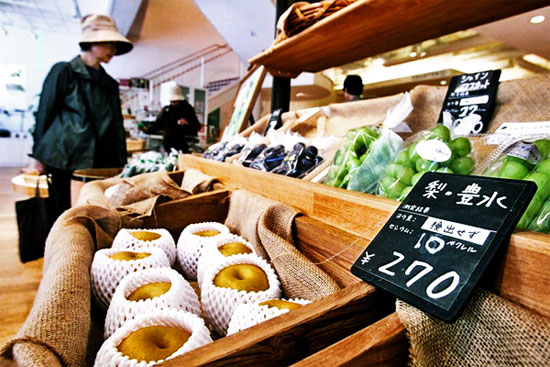Products from Fukushima no longer trace radiation
The catastrophic leak of radiation had affected Japan's Fukushima prefecture two years ago, forcing 160,000 residents to evacuate, seemingly receding into the past, after officials said the items were designed. Regular weaknesses such as rice, vegetables and other products have no trace of radioactivity.
To prove this, Japan's largest travel agency organized a study-survey trip at Fukushima.
The delegation visited a 10,000-hectare farm, once in a state of complete destruction after the tsunami and radiation leak.

Food at Fukushima was no longer radioactive
In the heyday, this farm produced food for about one million people.During the two years since the disaster, some people evacuated and local residents began to start the "Kaachan" energy project .
The "Kaachan" project involves providing safe meals made from rice, vegetables and other foods produced in Fukushima.
Mr. Tomiko Watanabe, one of the people involved in the project, said: "The food of Fukushima is safe because of the tightly controlled radioactive contamination. At present, the (radioactive concentration) standard of The Japanese government is 100 becquerels, in imported food, this number is 370 becquerel . ".
"But the Kaachan project only has a radioactive concentration of less than 20 becquerels. But despite this evidence, 44 countries still refuse to import Fukushima products. We are opposed to rumors and private stereotypes. thought ".
Seiji Kanno, a farmer, said 99.9% of rice harvested in Fukushima had a radioactive concentration of less than 25 becquerels.
He said that last year, school lunches in Japan did not use any products made from Fukushima. But now the Fukushima-made ingredients are used.
The well-known Japanese Toshiba company has also provided containers with real-time radioactivity equipment to stop rumors of contamination.
"In order to understand the reality, people should visit Fukushima to see the change taking place in a better way," said a research team member.
Megumi Noda, one of the study organizers, said: "The study trip is just the first step. In the near future, I want to invite foreigners to make a Fukushima study trip."
- Radiation in Japan is no longer dangerous
- Fukushima radiation spreads to the US coast
- Very high radiation index at Fukushima
- Japan seeks to reduce radiation levels in Fukushima
- Fukushima children are exposed to radiation below the danger threshold
- Accumulated contamination of Fukushima workers is still high
- Outdoor radiation in Fukushima reached a record
- Fukushima workers died not because of radiation
- Exotic plants after the Fukushima disaster
- Radiation from Fukushima is only 10% of the Chernobyl case
- Fukushima radiation to the North American coast
- Tokyo has a higher radiation exposure point in Fukushima
 Green tea cleans teeth better than mouthwash?
Green tea cleans teeth better than mouthwash? Death kiss: This is why you should not let anyone kiss your baby's lips
Death kiss: This is why you should not let anyone kiss your baby's lips What is salmonellosis?
What is salmonellosis? Caution should be exercised when using aloe vera through eating and drinking
Caution should be exercised when using aloe vera through eating and drinking